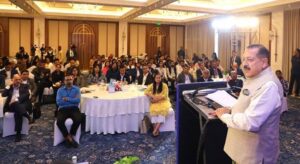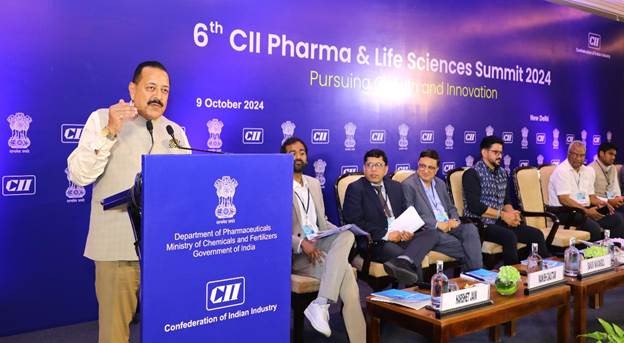CNN Central News & Network–ITDC India Epress/ITDC News Bhopal: The “Make in India” initiative is playing a crucial role in reducing our dependence on the import of Active Pharmaceutical Ingredients (API). By strengthening domestic drug manufacturing, we are not only promoting self-reliance but also ensuring that critical healthcare supplies are readily available. This was stated by Union Minister Dr. Jitendra Singh, Minister of State for Science and Technology (Independent Charge), Minister of State for Earth Sciences (Independent Charge), Minister of State for PMO, Department of Atomic Energy, Department of Space, and Minister of State for Personnel, Public Grievances, and Pensions, in his address.
Speaking at the sixth CII Pharma and Life Sciences Summit: 2024, Dr. Jitendra Singh remarked, “This forum serves as a vital platform for exchanging ideas between industry leaders, government officials, and academicians, and is a testament to India’s resolve to lead in the global pharmaceutical and biotechnology sectors.”
Praising the pharma industry, he said, “India’s emergence as a hub for affordable, high-quality medicines is truly commendable. We are now ranked third globally by volume and 14th by value in pharmaceutical production.” He further added that the development of biopharmaceuticals and biosimilar drugs, following the generic drug model, is one of the most remarkable shifts within the pharmaceutical industry.

Dr. Jitendra Singh stated that Prime Minister Narendra Modi envisions India leading the next industrial revolution in biotechnology. Due to initiatives like the PLI scheme, India is progressing toward becoming a global leader in biopharmaceuticals, bio-manufacturing, and life sciences by 2030. However, there is still much to be achieved. Congratulating CII and the life sciences industry on their success, the Minister stressed the need to not overlook future opportunities.
One out of every three tablets consumed worldwide is manufactured in India. A recent survey conducted by the Central Drugs Standard Control Organization (CDSCO) on 48,000 drug samples from all Indian states found only 0.0245 percent of substandard drugs. Considering the need to transport goods across different climate zones, it is essential to make the infrastructure and transportation of pharmaceutical products more efficient to maintain the effective potency of the medicines.
The development of the world’s first DNA vaccine for COVID-19 and the first Human Papillomavirus (HPV) vaccine for the prevention of cervical cancer in adolescent girls are prime examples of India’s leadership in global health. Additionally, by producing 65 percent of the world’s vaccines, India has significantly impacted health outcomes in low- and middle-income countries.
India’s bioeconomy has grown 13 times in just ten years, thanks to the thriving ecosystem of nearly 6,000 bio-startups. To maintain this momentum, the industry must continue investing in research and development, supporting young entrepreneurs, and fostering a robust startup ecosystem. The budget allocation of ₹50,000 crore for the National Research Foundation (NRF) over five years is a transformative step in building a knowledge-driven society. By addressing infrastructure gaps in universities, the NRF will encourage industry-academic collaboration, particularly in areas such as advanced materials, EV mobility, and health technology.







